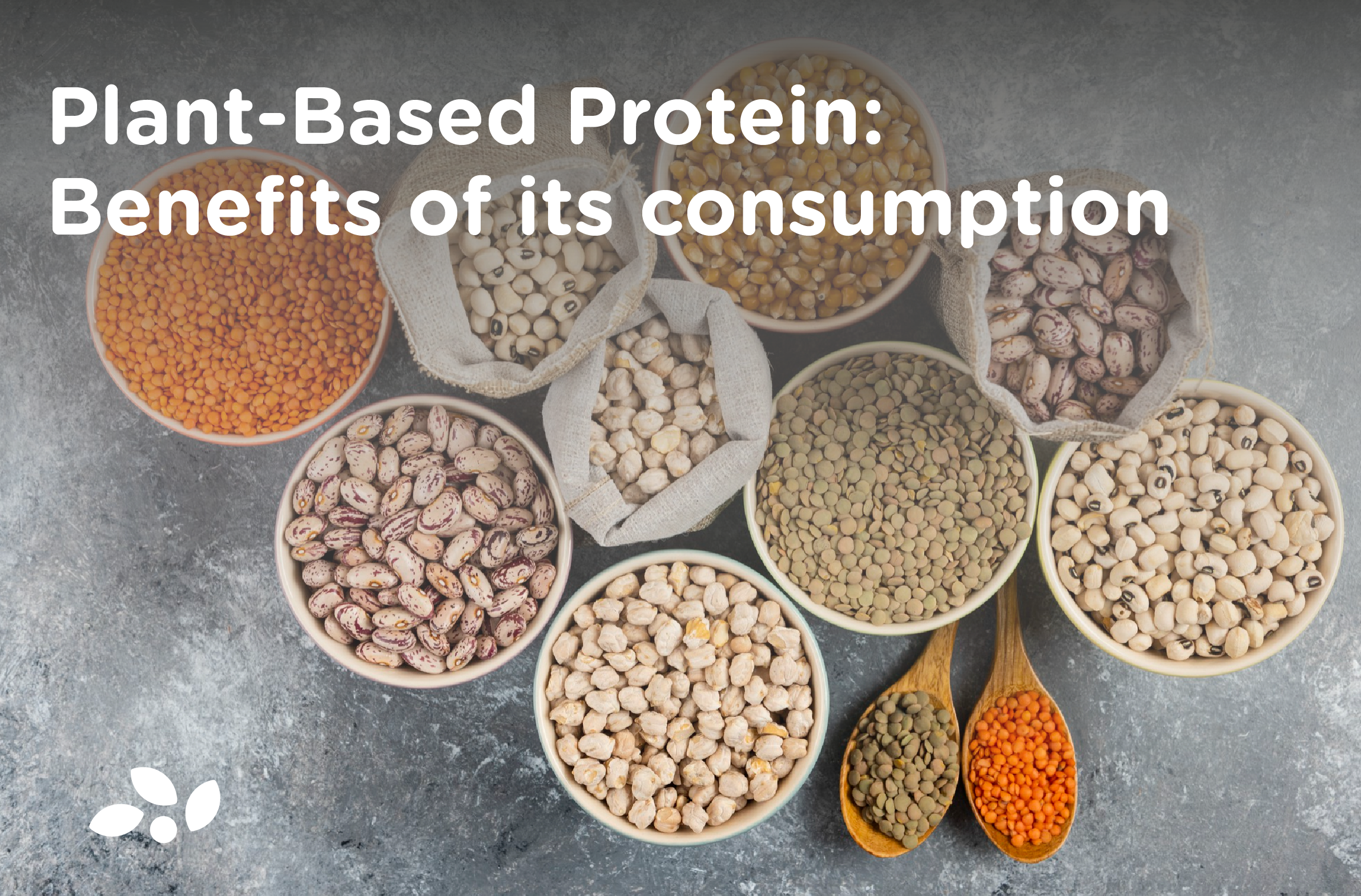Proteins are a source of essential nutrients for our body. Depending on their source, we can talk about animal or plant-based protein.
Besides considering the importance of the total amount of protein we should take, quality must be also considered. The protein quality it’s determined by the quantity of essential amino acids (basic components of proteins). Essential amino acids are those we should obtain through our basic diet, since our body cannot produce them.
Animal-based protein is an excellent source of zinc, iron, B vitamins and essential amino acids. These types of proteins have easy digestibility and provide all kinds of essential amino acids. However, the consumption of these type of proteins from different food groups is associated with a high risk of mortality and development of cardiovascular disease.
On the other hand plant-based proteins are commonly known as “incomplete” because they contain 50-90% of essential amino acids sequences. However, a healthy dietary food pattern combining different type of plant protein easily cover 100% of essential amino acids requirements intake [1][2]
Plant-based sources:
There are different sources of plant-based proteins, among the most common ones we can consider: legumes (soybeans, peas, lentils, chickpeas), cereals (wheat, oats, rice), pseudocereals (oats, quinoa, chia), nuts (walnuts, almonds, peanuts, macadamia nuts) and seeds (hemp and sunflower seeds), soy-based (such as tofu and tempeh), seitan (made from wheat protein) and mycoproteins (mushroom-based). We also find plant-based alternatives to dairy products. It’s always better to fins those fortified with B-group vitamins, calcium and iron and D vitamin. [3]
Besides these sources, there are also more innovative plant-bases options as: canola seed powder, lemna protein, amaranth and lupin flour, teff, etc.
Benefits for the body:
Plant-based proteins tend to provide more fiber and antioxidants, while containing less saturated fats, sodium, and cholesterol compared to animal proteins.
Cardiovascular health: authors of a systematic review of multiple clinical trials, reported a reduction in blood lipids in all studies, including lower levels of low-density cholesterol, non-high-density lipoprotein cholesterol, and apolipoprotein B. It is demonstrated that plant-based proteins help reduce cardiovascular risk factors in adults. [4]
Metabolic health: obesity is a metabolic issue affecting the entire population and continues to rise. The HELENA study [5] conducted on European adolescents suggested that increasing the consumption of plant-based protein in the daily diet as a substitution for animal protein helps control obesity. Incorporating more plants proteins into the diet to replace excess calories and animal proteins can be a useful strategy in addressing teenage obesity.
Diabetes: numerous studies suggest that higher intake of total and animal protein is associated with an increased risk of type 2 diabetes, while the intake of plant-based protein has a modest inverse association. [6]
Cancer: several studies suggest that substituting animal protein with plant protein in the diet could be a strategy to reduce the risk of colorectal cancer in individuals with a predominant genetic variant for this type of cancer. [7]However the role of plant-based proteins in cancer is an area that requires further research to determine whether plant protein confers anticancer benefits to provide more appropriate recommendations.
Chronic kidney disease (CKD): a beneficial association has been identified between plant-based proteins and estimated glomerular filtration rate. A 10-year longitudinal cohort study [8] conducted in women identifies this same benefit, but also linked it to other bioactive compounds found in plant-based foods such as fruits, vegetables and nuts.
Conclusions:
From a nutritional standpoint, it is essential to achieve the protein requirements for an optimal health.
For many people, eliminating animal-based protein can be a difficult decision, due to personal and social preferences or the lack of knowledge. However, advancements in research related to the beneficials effect, such as reducing the risk of developing chronic degenerative and metabolic diseases, of consuming plant-based proteins suggest that they should be incorporated into the daily diet.
To conclude, obtaining high quality protein from plant-based sources, it’s achievable through a healthy dietary food pattern, and it’s advisable to have it supervised by a nutritionist.
REFERENCES:
1. Petrusán J, Rawel H. Protein-rich vegetal sources and trends in human nutrition: A review Current Topics in Peptide & Protein Research, Vol. 17, 1 –19(17):1-19
2. Quesada D, Gómez G. ¿Proteínas de origen vegetal o de origen animal?: Una mirada a su impacto sobre la salud y el medio ambiente. Rev. Nutr. Clin. Metab. [Internet]. 1 de mayo de 2019 ;2(1):79-86
3. Monroy Rodríguez I, Castañeda Ovando A, Contreras López E, Jaimez Ordaz J. Proteínas vegetales: la clave para la alimentación basada en plantas . prepa1 [Internet]. 5 de enero de 2024;6(12):8-11
4. Zhao, H., Song, A., Zheng, C. et al. Effects of plant protein and animal protein on lipid profile, body weight and body mass index on patients with hypercholesterolemia: a systematic review and meta-analysis. Acta Diabetol 57, 1169–1180 (2020).
5. Lin, Y., Mouratidou, T., Vereecken, C. et al. Dietary animal and plant protein intakes and their associations with obesity and cardio-metabolic indicators in European adolescents: the HELENA cross-sectional study. Nutr J 14, 10 (2015).
6. Malik VS, Li Y, Tobias DK, Pan A, Hu FB. Dietary Protein Intake and Risk of Type 2 Diabetes in US Men and Women. Am J Epidemiol. 2016 Apr 15;183(8):715-28. doi: 10.1093/aje/kwv268. Epub 2016 Mar 28. PMID: 27022032; PMCID: PMC4832052.
7. Hertzler SR, Lieblein-Boff JC, Weiler M, Allgeier C. Plant Proteins: Assessing Their Nutritional Quality and Effects on Health and Physical Function. Nutrients. 2020 Nov 30;12(12):3704. doi: 10.3390/nu12123704. PMID: 33266120; PMCID: PMC7760812.



